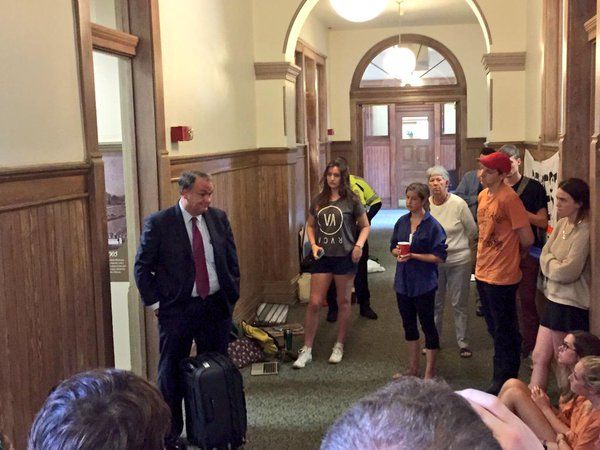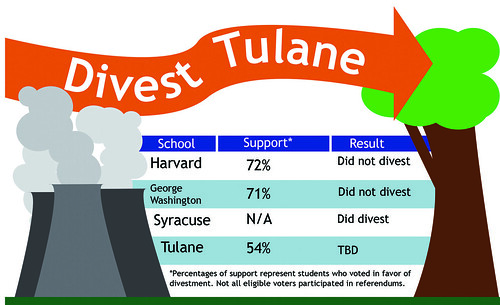Second divestment referendum sees increase in students voting ‘yes’

President Michael Fitts speaks to members of Divest Tulane during their sit-in in Gibson Hall in April 2015.
1,310 students, comprising 54 percent of the electorate, voted in support of Tulane divesting from the fossil fuel industry last week, as part of the second student referendum on the issue.
Only the undergraduate student body was eligible to vote in this election. Of this demographic, 36.16 percent of students voted, meaning that 19.53 percent of the undergraduate student body voted in favor of divesting.
During the first referendum on divestment in the spring of 2014, 1,041 students voted in favor.
These student referendums aim to quantify student support of divestment, according to Zak Davidson, the director of sustainability for the Tulane Undergraduate Student Government and a member of Divest Tulane. There was no formal agreement with administrators about their response to the results of the referendums.
“In meetings with the administration in 2014 and 2015, with a referendum demonstrating majority support for fossil fuel divestment, board members were obstinate, disregarding student voices,” Davidson said. “Once again, the results show that the student body stands behind fossil fuel divestment. We’re calling on the administration to be accountable to the values of Tulane’s student body.”
President Michael Fitts said he values student opinion, but previously expressed reluctance to divest during his October 2015 town hall meeting.
“Tulane has a wonderful and impressive student body of more than 13,449 students,” Fitts said. “We value and respect all of their varied opinions on this and other issues.”
Divest Tulane is one of many student-run organizations across the nation urging universities to remove endowment investments from the fossil fuel industry.
In November 2012, 72 percent of votes on a similar referendum at Harvard University were in favor of divesting from fossil fuels. Harvard still invests some of the school’s $30.7 billion endowment in the fossil fuel industry.
George Washington University’s April 2015 divestment referendum had the support of 71 percent of votes cast. The board of trustees at GWU has chosen not to divest.
The board of Syracuse University, however, decided to divest in April 2015 following a two-year long student campaign.
Tasha Sirotak | Associate Layout Editor
Junior Maggie Bishop, finance major and undergraduate president of the Tulane Energy Club, said she supports the move toward clean energy but not the implications of divestment.
“I agree with Divest that climate change is a pressing issue for this world,” Bishop said. “However, I do not think that divestment will accomplish this goal.”
Bishop explained that the endowment funds are traded on the secondary market — that is, are marked as an exchange between investors and speculators — and are not directly provided to energy companies as the secondary market requires the exchange of financial instruments (such as bonds, stocks or endowments) not of physical currency.
“Since Tulane divesting from fossil fuels will have absolutely no effect on the goals that Divest hopes to achieve, it seems silly to me to potentially hinder our endowment to make a point,” Bishop said.
Following this referendum, Davidson hopes that Divest Tulane can ensure USG’s support.
“We are aiming to reaffirm our USG endorsement, following current majority support from the student body,” Davidson said.
Your donation will support the student journalists of Tulane University. Your contribution will allow us to purchase equipment and cover our annual website hosting costs.



